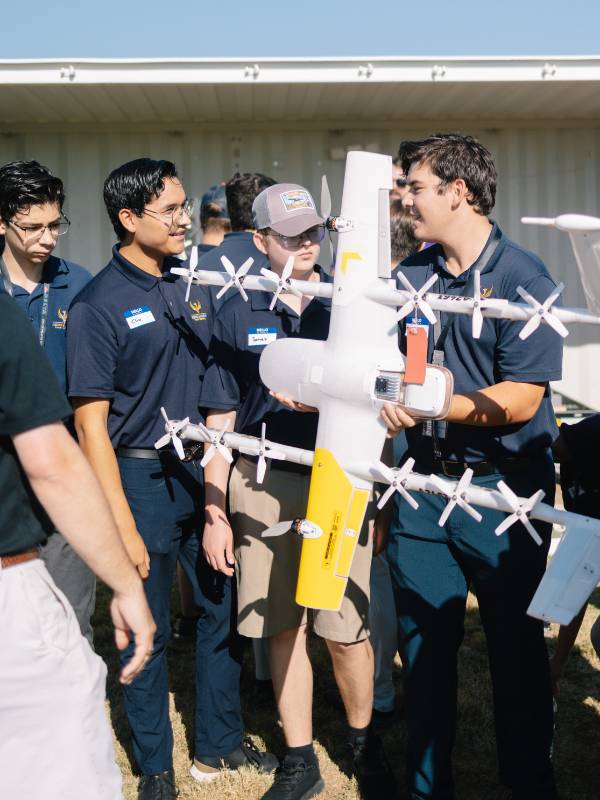A Career-Ready Drone Pilot Program For High School Students
How High School Students Can Get Their Drone Pilot License
Drones aren’t just a fun hobby for teens – they’re also becoming an increasingly important part of the aviation industry, from aerial photography to shipping and delivery.
At Rising Aviation, we offer a Drone Pilot License Program that allows high school students to earn their drone pilot certification while completing their regular coursework.
Over the course of the program students will explore aerial robotics and automated systems that will power the drones of the future.
With hands-on training in aerial photography, data gathering, robotics and more, our students gain valuable experience that can help them stand out in the job market.
Contact us today to discover how our drone program can help your teen.
What is a Drone Pilot’s License?
A Drone Pilot License, also known as a Remote Pilot Certificate, is a certification issued by the Federal Aviation Administration (FAA) that allows an individual to operate drones for commercial purposes.
This includes tasks such as aerial photography, data collection, and other applications where drones are used as a tool for business or industry.
To obtain a Drone Pilot License, an individual must pass an FAA-approved knowledge test that covers topics such as airspace regulations, drone flight operations, and safety procedures. Once they have passed the test and met all other requirements, they will be issued a Remote Pilot Certificate that allows them to operate drones for commercial purposes.
At Rising Aviation High School, we offer FAA drone certification (Part 107) training that allows high school students to earn their Remote Pilot Certificate while completing their regular coursework.
Where STEM Meets Drone Technology
In our STEM focused program students explore the science and systems behind Unmanned Aerial Systems (UAS), while developing skills in flight planning, data analysis, weather interpretation, and safe operational procedures.
With our career and technicial education (CTE) focused training students will be prepared to work in the aviation industry when the graduate.
What’s included in Drone Pilot License Program Located at the Addison Airport (KADS)
Rising Aviation students that apply for the Drone Pilot License Program will be able to earn their Remote Pilot Certificate from the FAA.
Students will engage in hands-on projects that blend drone piloting with robotics engineering, providing practical experience that is highly valued in the aviation industry
Many students will begin their drone program as early as freshman year so by the time they reach their 16th birthday they can apply for their Commercial Remote Pilot Certificate.
The program covers all of the steps and requirements of earning a Drone Pilot’s License according to the FAA, including:
Course & materials to study for FAA Drone Certificate knowledge requirements, including:
- Airport operations
- Operation at night
- Emergency procedures
- Crew resource management
- Radio communication procedures
- Physiological effects of drugs and alcohol
- Aeronautical decision-making and judgment
- Maintenance and preflight inspection procedures
- Small unmanned aircraft loading and performance
- Determining the performance of small unmanned aircraft
- Aviation weather sources and effects of weather on small unmanned aircraft performance
- Applicable regulations relating to small unmanned aircraft system rating privileges, limitations, and flight operation
- Airspace classification and operating requirements, and flight restrictions affecting small unmanned aircraft operation
Taking initial aeronautical knowledge exam: “Unmanned Aircraft General – Small (UAG)”
Certificate holders must complete an online recurrent training every 24 calendar months to maintain aeronautical knowledge and currency
Rising Aviation Drone Pilot Program Timeline
At the beginning of a Rising Aviation student’s junior year they’ll choose to pursue either the Private Pilot Pathway Program, the Aircraft Maintenance Technology Pathway Program or the Drone Pilot Pathway Program.
If they pursue the Drone Pilot Pathway this is what they will do each year.
Junior Year
The Drone Pathway course introduces students to the basic concepts of unmanned aircraft systems. They’ll cover topics such as regulations, operating requirements, robotics, safety protocols, emergency procedures, and more.
At the end of this course students will be prepared to take the Federal Aviation Administration’s Part 107 Remote Pilot written exam.
Senior Year
In the drone pathway students will explore practical applications of unmanned aircraft systems in a variety of fields such as agriculture, public safety, and photography. They’ll work individually or in small groups to study and report on an approved aviation topic related to unmanned aircraft operations.
Preparing Students for Career, Military, and College Opportunities
In addition to the career benefits of your teen having a STEM-related High School Diploma, obtaining a Drone Pilot’s License before graduating is a huge boost on a resume for anyone going into the aviation industry.
Whether your student plans to enter the workforce, join a military drone operations unit, or study aerospace technology in college, this program will help them prepare.



